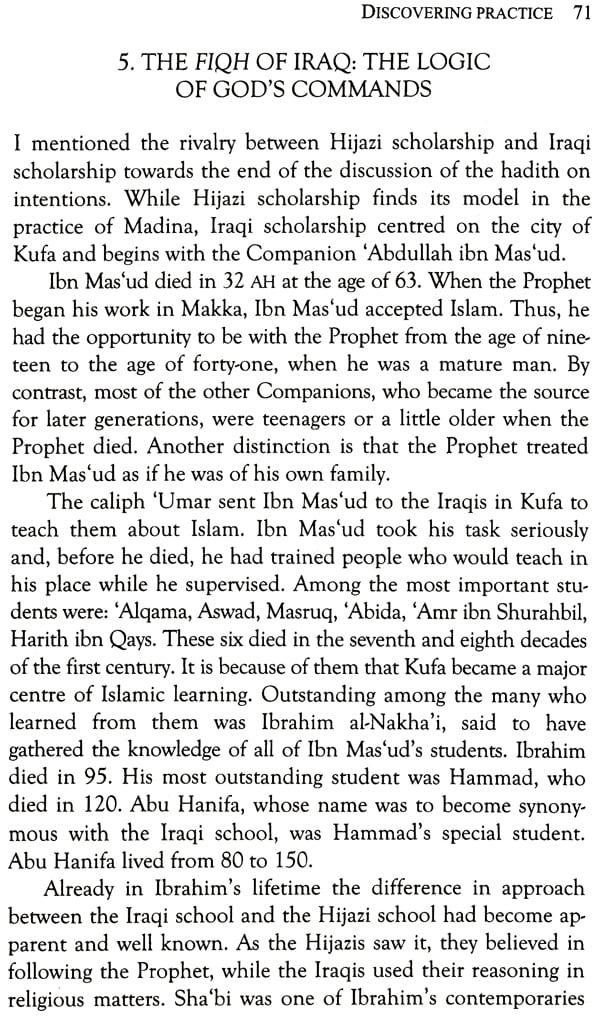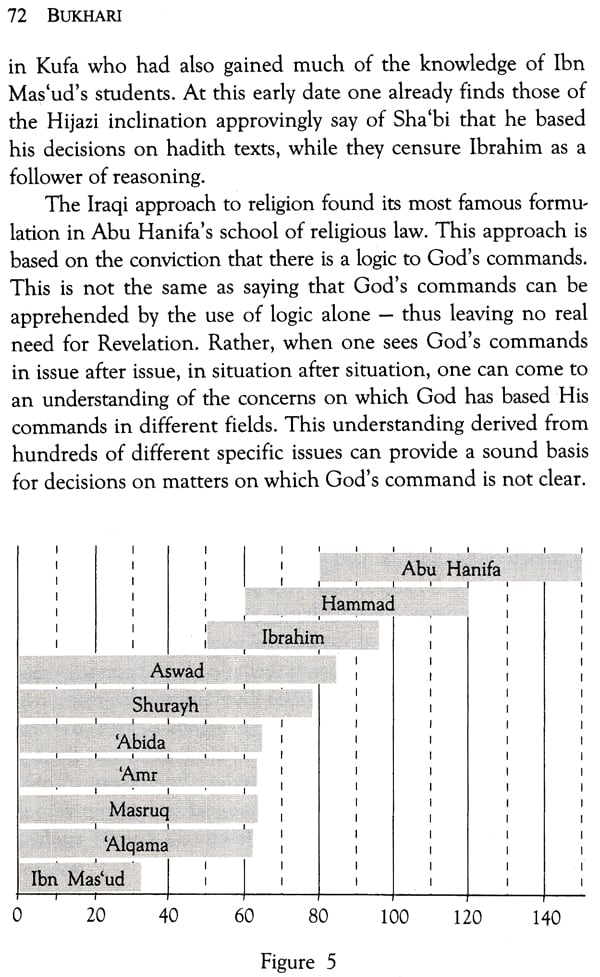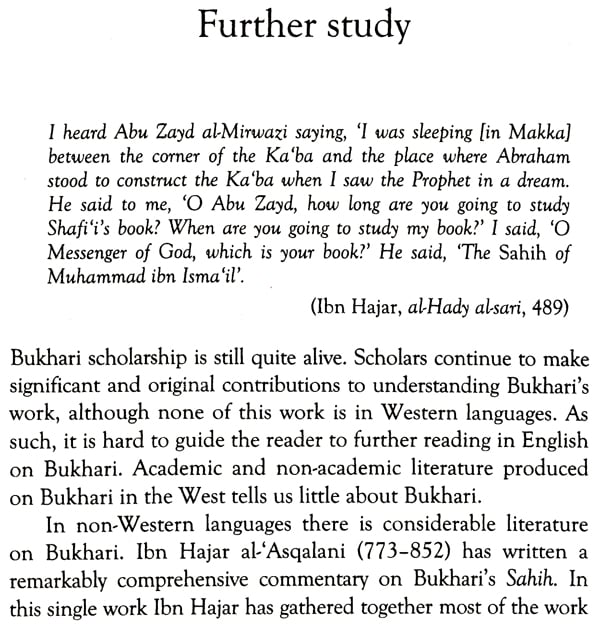
Bukhari (Makers of islamic Civilization)
Book Specification
| Item Code: | NAR959 |
| Author: | Ghassan Abdul - Jabbar |
| Publisher: | Oxford University Press |
| Language: | English |
| Edition: | 2007 |
| ISBN: | 9780195676563 |
| Pages: | 154 |
| Cover: | PAPERBACK |
| Other Details | 8.50 X 5.50 inch |
| Weight | 150 gm |
Book Description
Bukhari (d. 256(870) is famed throughout the Islamic world as the greatest practitioner in the field of hadith - textual reports of what the Prophet said, did or approved. Bukhari's magnum opus, the Sahib, is, after the Qur'an, the most widely revered book in Islam. It is a compilation of the soundest of sound hadiths. The Prophet's way (Surma) is understood by Muslims as embodying both the ideal and practical reality of what the Qur'an enjoins. Accordingly, much of the edifice of rules and norms of the Islamic way of life is constructed around the hadith.
Most people read the Sahih as a transparent medium through which they can 'hear the Prophet speak. In reality, Bukhari's work is a highly sophisticated argument about how hadiths are verified, what meaning and authority they carry, and how far the practice of the Prophet can be securely derived from them. When Bukhari wrote the Sahih, these were not settled questions. The book appeared at a turning-point in the history of Islamic scholarship, and helped determine its future direction.
In this remarkably lucid essay, addressed to the non-specialist, the author disentangles Bukhari's subtle handling and arrangement of his material, explaining how far his approach to questions about textual authenticity and authority differed from his predecessors and contemporaries. These questions, of abiding concern in alt societies, have a particular relevance and urgency for modern Islamic scholarship.
Ghassan Abdul-Jabbar is a specialist in hadith studies. He did his PhD at the University of Chicago and then post-doctoral research at Oxford University. He now works in Lahore University as well as travels exten-sively as an Islamic teacher in the classic peripatetic style alluded to in this book.
Muhammad ibn Isma`il al-Bukhari is one of the most well-known scholars that Islam has produced in fourteen centuries. People speak of him as `al-Imam al-Bukhari': 'Imam' is a title that means that he is a leader among scholars, while `Bulchare means 'from Bukhara', the Central Asian city in what is now the republic of Uzbekistan.
Bukhari figures as one of the most well-known experts in the hadith literature - hadiths being the most important texts in Islam after the Qur'an. A hadith is a textual report of words and deeds of the Prophet, or of words spoken or deeds done in his presence with his explicit or tacit approval. The primary text in Islam is the Qur'an. It consists of the words of God Himself. While the Prophet pronounced the words of the Qur'an, the tradition is very clear in separating his speech from God's speech. The Prophet's words have authority, but they are quite distinct from God's words. The latter make up the Qur'an. The former constitute the large corpus of texts called `hadith'.
The Qur'an is only about 70,000 words. There are minor variants of words and brief phrases, but they have not played a significant role in scholarly debates. For all practical purposes, there has been little disagreement throughout history about the text of the Qur'an itself. By contrast, hadiths run into the tens of thousands. If we count each variant reporting as a sepa-rate hadith, there are at least a few hundred thousand hadiths preserved in the books available today. Each hadith text is an independent text with its own academic apparatus in the form of the chain of narrators through whom it is reported. Slight modifications in that chain and corresponding differ-ences in text can generate hundreds of variants of a 'single' hadith.
To illustrate the formal appearance of hadith texts, here is the final hadith in Bukhari's magnum opus, the Sahih:
Ahmad ibn Ishkab narrated to me that
Muhammad ibn Fudayl narrated to me, from
`Umara ibn Qa`cia`, from
Abu Zur`a, from
Abu Hurayra (God be pleased with him), he said
the Prophet (God's blessings and mercy on him) said:
There are two statements, which the Merciful (God) loves, which are light on the tongue but which will weigh heavy in the scale of good deeds: 'God is beyond all shortcomings, and I praise Him; God the Great is beyond all shortcomings'.
The list of names preceding the text, the 'chain of narration', is its documentation. The connecting elements (italicized above) following each name specify the claim of the documentation. For example, here the first two narrators explicitly claim that they themselves heard the text from the person they name. The next three, however, simply say that they have this text from the person they mention. Perhaps they heard the text from this person directly; perhaps someone reliable told them that the person mentioned conveys this text. I will return to such nuances in Chapter 5.
Bukhari dedicated his life to collecting and analysing texts like this. He had memorized a great number of them, and he was very reliable in transmitting them accurately. But his claim to fame rests upon his achievements in three disci-plines connected to hadith. First, he was outstanding in his ability to derive the implications of particular hadiths for differ-ent contexts. The name for this discipline in the Islamic tradition is fiqh (understanding the law, jurisprudence). Second, he had a vast knowledge of the biographies of the people whose names occur in such chains of narration, and of their reliability and expertise in preserving and transmitting texts. This is the discipline of rijal (literally, 'men). Third, a hadith scholar can often present several different chains of narration to support a single text. Bukhari was an expert at identifying the most reliable of these chains and any hidden technical problems in them, and hence he was an expert at identifying any weaknesses in the most reliable transmissions of a text. This is the discipline of ilal (literally, 'illnesses', 'blemishes). In this book I have tried to introduce the reader to Bukhari's work in fiqh, rijal, and ilal.
1. WHAT THIS BOOK COVERS
After a brief look at the life of Bukhari in Chapter 2, the substance of this book is in Chapters 3-5. Chapters 3 and 4 address the problem of assigning meaning to hadith texts -Bukhari's way of doing this, and the way others approached this issue. Chapter 5 then describes the problem of verifying the authenticity of texts - how Bukhari did this and how others did it differently.
In this brief work I have limited the discussion to the two issues of meaning and verification. In each case, I have used instances from Bukhari's works to show how he has dealt with these issues, and I have tried to put his work in the context of approaches other scholars have taken.
Readers familiar with hadith studies will recognize the issue as that of the relationship of jurisprudence to hadith. A popular view is that the scholars of jurisprudence were those who relied on their own understanding of religion more than on specific texts. On this popular view, Bukhari is seen as the leader of those who argued for basing religion on texts, usually of a hadith and, in particular, of the soundest relevant hadith. One cannot understand Bukhari's work without under-standing the role of texts in religious understanding. I discuss this in Chapters 3 and 4.
In Chapter 5 I turn to the academic apparatus supporting the hadith text, and to how Bukhari determined the sound-ness of a hadith. This is the area in which he made his greatest contribution. Here again, that contribution is best understood against the background of the history of how other hadith scholars approached that task.
Following a summary conclusion in Chapter 6, the last chapter offers suggestions for further reading.
2. WHAT THIS BOOK LEAVES OUT
a. Doctrinal controversies
A series of doctrinal controversies form important back-ground to Bukhari's work.
**Contents and Sample Pages**












